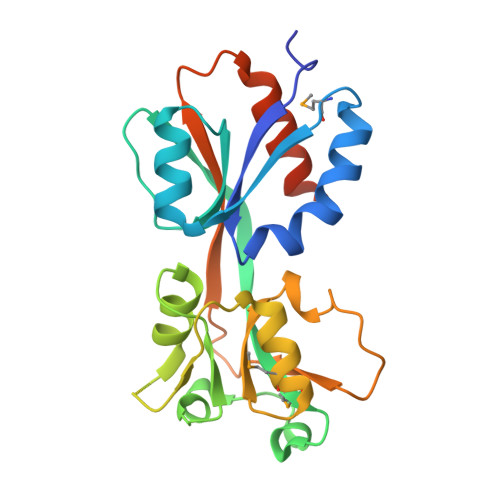Structural details of the OxyR peroxide-sensing mechanism
Jo, I., Chung, I.Y., Bae, H.W., Kim, J.S., Song, S., Cho, Y.H., Ha, N.C.(2015) Proc Natl Acad Sci U S A 112: 6443-6448
- PubMed: 25931525
- DOI: https://doi.org/10.1073/pnas.1424495112
- Primary Citation of Related Structures:
4X6G, 4XWS, 4Y0M - PubMed Abstract:
OxyR, a bacterial peroxide sensor, is a LysR-type transcriptional regulator (LTTR) that regulates the transcription of defense genes in response to a low level of cellular H2O2. Consisting of an N-terminal DNA-binding domain (DBD) and a C-terminal regulatory domain (RD), OxyR senses H2O2 with conserved cysteine residues in the RD. However, the precise mechanism of OxyR is not yet known due to the absence of the full-length (FL) protein structure. Here we determined the crystal structures of the FL protein and RD of Pseudomonas aeruginosa OxyR and its C199D mutant proteins. The FL crystal structures revealed that OxyR has a tetrameric arrangement assembled via two distinct dimerization interfaces. The C199D mutant structures suggested that new interactions that are mediated by cysteine hydroxylation induce a large conformational change, facilitating intramolecular disulfide-bond formation. More importantly, a bound H2O2 molecule was found near the Cys199 site, suggesting the H2O2-driven oxidation mechanism of OxyR. Combined with the crystal structures, a modeling study suggested that a large movement of the DBD is triggered by structural changes in the regulatory domains upon oxidation. Taken together, these findings provide novel concepts for answering key questions regarding OxyR in the H2O2-sensing and oxidation-dependent regulation of antioxidant genes.
- Department of Agricultural Biotechnology, Center for Food Safety and Toxicology, Center for Food and Bioconvergence, Research Institute for Agricultural and Life Sciences, Seoul National University, Seoul 151-921, Republic of Korea; and.
Organizational Affiliation:

















